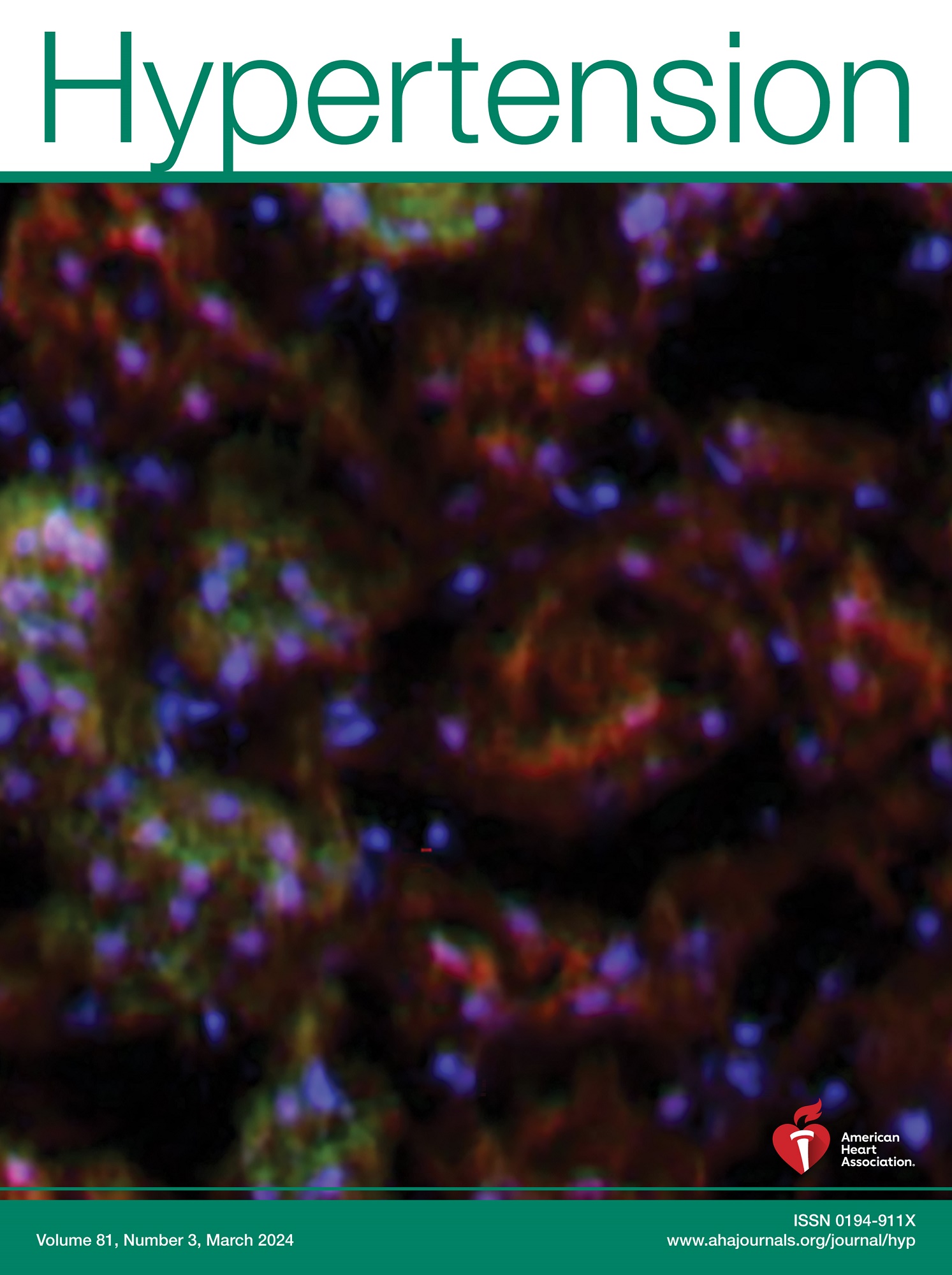Targeting N6-Methyladenine of Tubular Mitochondrial DNA Against Hypertensive CKD.
IF 8.2
1区 医学
Q1 PERIPHERAL VASCULAR DISEASE
引用次数: 0
Abstract
BACKGROUND Hypertension is a significant global health issue that contributes to chronic kidney disease (CKD). Mitochondrial dysfunction in renal tubular epithelial cells (TECs) plays a crucial role in the progression of CKD. However, the involvement of mitochondrial DNA (mtDNA) methylation in hypertensive CKD and its potential as a therapeutic target remains largely unexamined. METHODS/RESULTS Utilizing high-confidence Nanopore sequencing, we identified N6-methyladenine (6mA) as the predominant methylation type in renal mtDNA, rather than 5-methylcytosine. In mice with hypertensive CKD induced by AngII (angiotensin II) infusion, renal mtDNA 6mA levels significantly increased, while 5-methylcytosine levels remained stable. METTL4 (methyltransferase-like protein 4), the only known mammalian methyltransferase for 6mA, was upregulated in the renal tubules of hypertensive CKD mice and patients with hypertension. AngII stimulation increased METTL4 expression and mtDNA 6mA levels in primary TECs. Activated c-Jun/AP-1 (activator protein-1) directly promoted Mettl4 transcription in AngII-treated primary TECs. METTL4-catalyzed mtDNA 6mA impeded mitochondrial transcription initiation complex assembly, thereby halting mtDNA transcription, disrupting mitochondrial function, and resulting in the transition of TECs into a proinflammatory and profibrotic phenotype. TEC-specific Mettl4 gene deletion in mice exhibited reduced mtDNA 6mA, preserved mtDNA transcription, improved tubular mitochondrial function, and alleviation of hypertensive CKD. CONCLUSIONS This study reveals that METTL4-catalyzed mtDNA 6mA contributes to renal mitochondrial dysfunction and hypertensive CKD, offering novel therapeutic strategies from the perspective of mitochondrial epigenetics.靶向小管线粒体DNA n6 -甲基腺嘌呤治疗高血压CKD。
背景:高血压是导致慢性肾脏疾病(CKD)的重要全球健康问题。肾小管上皮细胞(tec)线粒体功能障碍在CKD的进展中起着至关重要的作用。然而,线粒体DNA (mtDNA)甲基化在高血压CKD中的作用及其作为治疗靶点的潜力在很大程度上仍未得到证实。方法/结果利用高置信度的纳米孔测序,我们确定n6 -甲基腺嘌呤(6mA)是肾脏mtDNA中主要的甲基化类型,而不是5-甲基胞嘧啶。在输注AngII (angiotensin II)诱导的高血压CKD小鼠中,肾脏mtDNA 6mA水平显著升高,而5-甲基胞嘧啶水平保持稳定。METTL4(甲基转移酶样蛋白4)是唯一已知的哺乳动物6mA甲基转移酶,在高血压CKD小鼠和高血压患者的肾小管中上调。AngII刺激增加了原发性tec中METTL4表达和mtDNA 6mA水平。激活的c-Jun/AP-1(激活蛋白-1)直接促进了血管内皮细胞中Mettl4的转录。mettl4催化的mtDNA 6mA阻碍线粒体转录起始复合物组装,从而停止mtDNA转录,破坏线粒体功能,导致tec转变为促炎和纤维化表型。tec特异性Mettl4基因缺失小鼠表现出mtDNA 6mA降低,mtDNA转录保留,小管线粒体功能改善,高血压CKD减轻。结论mettl4催化的mtDNA 6mA参与肾脏线粒体功能障碍和高血压CKD,从线粒体表观遗传学角度提供新的治疗策略。
本文章由计算机程序翻译,如有差异,请以英文原文为准。
求助全文
约1分钟内获得全文
求助全文
来源期刊

Hypertension
医学-外周血管病
CiteScore
15.90
自引率
4.80%
发文量
1006
审稿时长
1 months
期刊介绍:
Hypertension presents top-tier articles on high blood pressure in each monthly release. These articles delve into basic science, clinical treatment, and prevention of hypertension and associated cardiovascular, metabolic, and renal conditions. Renowned for their lasting significance, these papers contribute to advancing our understanding and management of hypertension-related issues.
 求助内容:
求助内容: 应助结果提醒方式:
应助结果提醒方式:


